During the fasting month of Ramadhan each year, Emha and Kiai Kanjeng are usually busy with engagements and performances. Sometimes there are two in one day. The group are on tour, moving on to a new town and a new venue daily, travelling in tour buses, spending hours at a time on the road. At the same time, they are fasting during the long daylight hours, and away from their families, while Ramadhan is generally a month when Muslims would be with their families. There is one special night during Ramadhan, the night of Nuzulul Qu’ran, the 17th night of Ramadhan, which is celebrated as the night that the first verses of the Holy Koran were revealed to the Prophet Muhammad, via the intercession of the angel Gabriel.
In recent years Emha and Kiai Kanjeng have been invited to perform at the Cut Meutia mosque on that evening. This year, 2006, it fell on a Saturday evening, October 14th. Cut Meutia, a large and popular, progressive mosque in the Menteng area of central Jakarta was buzzing with crowds of young people when I arrived at around 6.00pm. I had driven into town and taken a wrong turn so I was delayed and arrived slightly later than I had expected. People of all kinds were milling about. There was an amazing atmosphere as they enjoyed snacks and drinks on sale and stood around browsing at the many impromptu bookstalls and other offerings on display for sale. Cut Meutia has large open areas and the central courtyard was laid out with a ground covering for the crowds who were expected for the all-night performances. Many were already seated. As the proceedings began, at around 8.00pm, it really did appear from the stage as if there were a ‘sea of veils’.
I had gone backstage and was talking with the members of Kiai Kanjeng prior to their performance. They had just eaten and were relaxed and in good spirits, joking and teasing one another, assured and confidence as only musicians and artists who have been playing together literally for years can be. Band leader, composer and arranger Novi Budianto was going over the detials of the set list and making some last minute adjustments to some of the songs. Kiai Kanjeng immediately set them to memory. Emha was there but he was busy in a corner talking with a number of prominent persons who had come to see him and consult with him on various matters. Mbah Surip, the beloved street singer and Kenduri Cinta regular was there. Stick-thin, with a beaten-up guitar and matted dreadlocks, he resembled a sort of anime version of Bob Marley from hell. He really does have to be seen to be believed. He lights up Kenduri Cinta performances with his simple guitar tunes and simpler lyrics, and his familiar catch phrase – “I love you fulllll!!”
Bertha, the vocalist, who had recently begun to accompany Kiai Kanjeng at Kenduri Cinta and other performances, was also there. She joined Kiai Kanjeng on their trip to Finland in November and December 2006 and would take part in this evening’s proceedings too. Her signature tune is a rousing song entitled Subhanallah. Also present and engaged in discussion were the members of the Kenduri Cinta team; a core group of dedicated young men and women, some with families, some without, who work tirelessly to support Emha in Jakarta, making arrangements for Kenduri Cinta and other events. Several people from Paramadina were including Indah Dahlan, a familiar face at Kenduri Cinta and a key facilitator of Paramadina’s Paramasuara events with Emha and Kiai Kanjeng. Novia Kolopaking, Emha’s wife, who would also perform, was there too.
The stage was winged with large screens and a very good sound system so that the audience could catch all the action, wherever they were seated. Drinking water and snacks were being passed around by committee members and mosque activists and small children were wandering around between people. Others slept on the matting or on their mothers’ laps. Seated at the front were members of the Jakarta political elite as well as a number of celebrities. There was a hum of conversation which could be heard over the sound of the addresses that were being made by the event’s organisers.
By 8.00pm the seating area was packed and proceedings began. Later on, after a number of addresses had been made, Kiai Kanjeng were announced and the assembled crowd found themselves listening to the strains of Silent Night. Only this time, the familiar lyrics had been substituted with the lyrics for the Shalawat Badr, the popular Islamic song in praise of the Prophet Muhammad and his early victory at the Battle of Badr.
"Sholatullah salamullah
'Ala thoha Rasulillah
Sholatullah salamullah
Ala yaasin Habibillah..."
It is always a beautiful experience to hear this song performed in this way. I have described its use on a number of occasions in these pages, including during the account of the first UK tour. However, it is provocative, because it clearly a Christian song, and Cut Meutia is a prominent mosque. But to hear the melody being used as the backdrop for the deeply spiritual lyrics, always moving for Muslims, is really the essence of Emha’s thought and work in the field of religious tolerance and pluralism.
Kompas later reported on Thursday, October 19th that the song was performed beautifully by Emha and Kiai Kanjeng. They wrote a piece entitled “Ada Apa dengan Pluralisme?” It was a play on words. Emha had recently held a Kenduri Cinta gathering with the title “Ada Apa dengan Pluralisme atau Apa Ada Pluralisme?” This means, loosely translated, “What’s Up with Pluralism or Do We Even Have it?” Pluralism has been a central theme in Emha’s thought for some years. It is at the very centre of his work in the field; the core of what he does in his gatherings and forums.
There he was, dressed in white as all Kiai kanjeng were, delivering what at first hearing would seem to be a popular Gospel number, but which on closer hearing turned out to be a prime example of what Kompas called Kiai kanjeng’s contemporary gamelan. Whatever it was, the applause, shouts and enthusiastic cheers from the crowd seemed to go on longer than the song.
"There are no Christian songs, there are no Islamic songs. I’m not a singer, I am praising the Prophet” said Emha.
This, wrote Kompas, is one way in which Emha turns back the waves of popular thought in the understanding of religion. Kompas wrote that Emha was controversial that night. He was breaking down familiar patterns of thought, assumptions and accepted ideas. It was deconstruction all over again, perhaps the perfect example. “New concepts were emerging, being shaped in this oasis of thought, refreshing hearts and minds.”
One of the common themes discussed in Emha’s discussion forums and communities is pluralism. "What’s up with pluralism; does it really exist?” According to Emha, Indonesia has not had a problem with pluralism since the times of the Majapahit Empire, which covered most of the territory of present-day Indonesia and was centred on East Java.
"Since the days of our ancestors this nation has been plural and all have been able to live together. Perhaps now there is intervention from outside,” suggested Emha, whose eyes appeared to defy resistance as he spoke with conviction and assuredness.
Confidently, he declared that he was a supporter of pluralism. Emha was willing to accept differences in religion and culture. However, what he often saw were errors in the understanding of what pluralism actually was.
“Pluralism does not mean that we consider all religions to be the same. Islam is different from Christianity, from Buddhism, from Catholicism, from Hinduism. They cannot be made the same. Let what is different be different. We all have to respect that,” said Emha.
Kompas noted that in many forums where Emha and Kiai Kanjeng appeared, pluralism would often be a topic. Emha has used a great deal of time in attempting to establish an enhanced understanding of the concept. He always works to improve the understanding and use of terms, their meanings and etymologies, as well as their wider context. One such term is ‘dakwah’ whch means religious propagation, and which he considers to have become contaminated.
“There are no longer any parameters as who is qualified or not to conduct ‘dakwah’. The primary form of ‘dakwah’ is not so much about what we say, but rather a question of what we do. Those who do god are already conducting ‘dakwah’, he said.
And that was the reason he gave for being happier to appear with his wife and Kiai Kanjeng at cultural events, mosques and in the community, where his work would not be considered to be direct ‘dakwah.’
“That is only a form of service, and service is a form of worship which should be conducted not only vertically but also horizontally," said Emha as he took the stage to serve the assembled crowds at Cut Meutia.
It was a long night.
In recent years Emha and Kiai Kanjeng have been invited to perform at the Cut Meutia mosque on that evening. This year, 2006, it fell on a Saturday evening, October 14th. Cut Meutia, a large and popular, progressive mosque in the Menteng area of central Jakarta was buzzing with crowds of young people when I arrived at around 6.00pm. I had driven into town and taken a wrong turn so I was delayed and arrived slightly later than I had expected. People of all kinds were milling about. There was an amazing atmosphere as they enjoyed snacks and drinks on sale and stood around browsing at the many impromptu bookstalls and other offerings on display for sale. Cut Meutia has large open areas and the central courtyard was laid out with a ground covering for the crowds who were expected for the all-night performances. Many were already seated. As the proceedings began, at around 8.00pm, it really did appear from the stage as if there were a ‘sea of veils’.
I had gone backstage and was talking with the members of Kiai Kanjeng prior to their performance. They had just eaten and were relaxed and in good spirits, joking and teasing one another, assured and confidence as only musicians and artists who have been playing together literally for years can be. Band leader, composer and arranger Novi Budianto was going over the detials of the set list and making some last minute adjustments to some of the songs. Kiai Kanjeng immediately set them to memory. Emha was there but he was busy in a corner talking with a number of prominent persons who had come to see him and consult with him on various matters. Mbah Surip, the beloved street singer and Kenduri Cinta regular was there. Stick-thin, with a beaten-up guitar and matted dreadlocks, he resembled a sort of anime version of Bob Marley from hell. He really does have to be seen to be believed. He lights up Kenduri Cinta performances with his simple guitar tunes and simpler lyrics, and his familiar catch phrase – “I love you fulllll!!”
Bertha, the vocalist, who had recently begun to accompany Kiai Kanjeng at Kenduri Cinta and other performances, was also there. She joined Kiai Kanjeng on their trip to Finland in November and December 2006 and would take part in this evening’s proceedings too. Her signature tune is a rousing song entitled Subhanallah. Also present and engaged in discussion were the members of the Kenduri Cinta team; a core group of dedicated young men and women, some with families, some without, who work tirelessly to support Emha in Jakarta, making arrangements for Kenduri Cinta and other events. Several people from Paramadina were including Indah Dahlan, a familiar face at Kenduri Cinta and a key facilitator of Paramadina’s Paramasuara events with Emha and Kiai Kanjeng. Novia Kolopaking, Emha’s wife, who would also perform, was there too.
The stage was winged with large screens and a very good sound system so that the audience could catch all the action, wherever they were seated. Drinking water and snacks were being passed around by committee members and mosque activists and small children were wandering around between people. Others slept on the matting or on their mothers’ laps. Seated at the front were members of the Jakarta political elite as well as a number of celebrities. There was a hum of conversation which could be heard over the sound of the addresses that were being made by the event’s organisers.
By 8.00pm the seating area was packed and proceedings began. Later on, after a number of addresses had been made, Kiai Kanjeng were announced and the assembled crowd found themselves listening to the strains of Silent Night. Only this time, the familiar lyrics had been substituted with the lyrics for the Shalawat Badr, the popular Islamic song in praise of the Prophet Muhammad and his early victory at the Battle of Badr.
"Sholatullah salamullah
'Ala thoha Rasulillah
Sholatullah salamullah
Ala yaasin Habibillah..."
It is always a beautiful experience to hear this song performed in this way. I have described its use on a number of occasions in these pages, including during the account of the first UK tour. However, it is provocative, because it clearly a Christian song, and Cut Meutia is a prominent mosque. But to hear the melody being used as the backdrop for the deeply spiritual lyrics, always moving for Muslims, is really the essence of Emha’s thought and work in the field of religious tolerance and pluralism.
Kompas later reported on Thursday, October 19th that the song was performed beautifully by Emha and Kiai Kanjeng. They wrote a piece entitled “Ada Apa dengan Pluralisme?” It was a play on words. Emha had recently held a Kenduri Cinta gathering with the title “Ada Apa dengan Pluralisme atau Apa Ada Pluralisme?” This means, loosely translated, “What’s Up with Pluralism or Do We Even Have it?” Pluralism has been a central theme in Emha’s thought for some years. It is at the very centre of his work in the field; the core of what he does in his gatherings and forums.
There he was, dressed in white as all Kiai kanjeng were, delivering what at first hearing would seem to be a popular Gospel number, but which on closer hearing turned out to be a prime example of what Kompas called Kiai kanjeng’s contemporary gamelan. Whatever it was, the applause, shouts and enthusiastic cheers from the crowd seemed to go on longer than the song.
"There are no Christian songs, there are no Islamic songs. I’m not a singer, I am praising the Prophet” said Emha.
This, wrote Kompas, is one way in which Emha turns back the waves of popular thought in the understanding of religion. Kompas wrote that Emha was controversial that night. He was breaking down familiar patterns of thought, assumptions and accepted ideas. It was deconstruction all over again, perhaps the perfect example. “New concepts were emerging, being shaped in this oasis of thought, refreshing hearts and minds.”
One of the common themes discussed in Emha’s discussion forums and communities is pluralism. "What’s up with pluralism; does it really exist?” According to Emha, Indonesia has not had a problem with pluralism since the times of the Majapahit Empire, which covered most of the territory of present-day Indonesia and was centred on East Java.
"Since the days of our ancestors this nation has been plural and all have been able to live together. Perhaps now there is intervention from outside,” suggested Emha, whose eyes appeared to defy resistance as he spoke with conviction and assuredness.
Confidently, he declared that he was a supporter of pluralism. Emha was willing to accept differences in religion and culture. However, what he often saw were errors in the understanding of what pluralism actually was.
“Pluralism does not mean that we consider all religions to be the same. Islam is different from Christianity, from Buddhism, from Catholicism, from Hinduism. They cannot be made the same. Let what is different be different. We all have to respect that,” said Emha.
Kompas noted that in many forums where Emha and Kiai Kanjeng appeared, pluralism would often be a topic. Emha has used a great deal of time in attempting to establish an enhanced understanding of the concept. He always works to improve the understanding and use of terms, their meanings and etymologies, as well as their wider context. One such term is ‘dakwah’ whch means religious propagation, and which he considers to have become contaminated.
“There are no longer any parameters as who is qualified or not to conduct ‘dakwah’. The primary form of ‘dakwah’ is not so much about what we say, but rather a question of what we do. Those who do god are already conducting ‘dakwah’, he said.
And that was the reason he gave for being happier to appear with his wife and Kiai Kanjeng at cultural events, mosques and in the community, where his work would not be considered to be direct ‘dakwah.’
“That is only a form of service, and service is a form of worship which should be conducted not only vertically but also horizontally," said Emha as he took the stage to serve the assembled crowds at Cut Meutia.
It was a long night.

































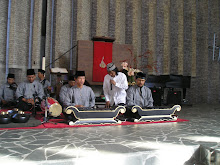
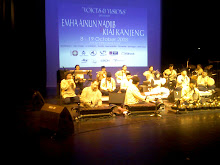

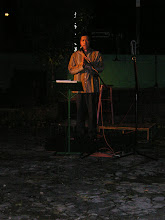



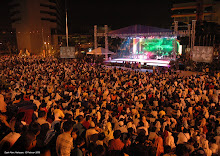
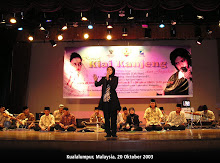
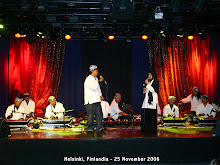.jpg)



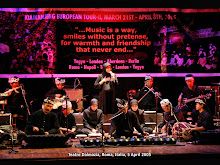


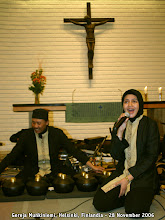.jpg)

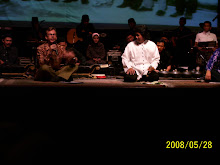.jpg)
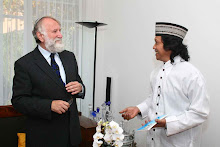
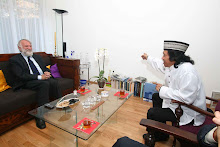
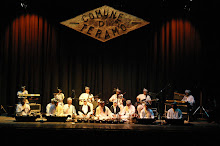


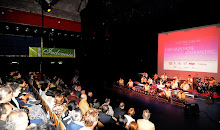

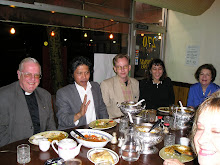


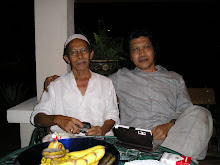
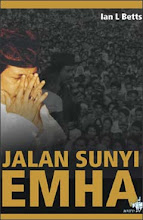
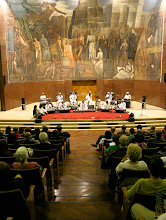
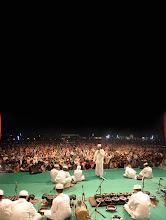

No comments:
Post a Comment